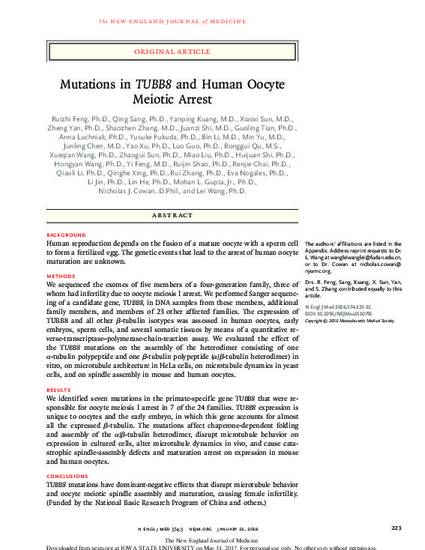
Article
Mutations in TUBB8 and Human Oocyte Meiotic Arrest
The New England Journal of Medicine
Document Type
Article
Disciplines
Publication Version
Published Version
Publication Date
1-21-2016
DOI
10.1056/NEJMoa1510791
Abstract
BACKGROUND Human reproduction depends on the fusion of a mature oocyte with a sperm cell to form a fertilized egg. The genetic events that lead to the arrest of human oocyte maturation are unknown.
METHODS We sequenced the exomes of five members of a four-generation family, three of whom had infertility due to oocyte meiosis I arrest. We performed Sanger sequencing of a candidate gene, TUBB8, in DNA samples from these members, additional family members, and members of 23 other affected families. The expression of TUBB8 and all other β-tubulin isotypes was assessed in human oocytes, early embryos, sperm cells, and several somatic tissues by means of a quantitative reverse- transcriptase–polymerase-chain-reaction assay. We evaluated the effect of the TUBB8 mutations on the assembly of the heterodimer consisting of one α-tubulin polypeptide and one β-tubulin polypeptide (α/β-tubulin heterodimer) in vitro, on microtubule architecture in HeLa cells, on microtubule dynamics in yeast cells, and on spindle assembly in mouse and human oocytes.
RESULTS We identified seven mutations in the primate-specific gene TUBB8 that were responsible for oocyte meiosis I arrest in 7 of the 24 families. TUBB8 expression is unique to oocytes and the early embryo, in which this gene accounts for almost all the expressed β-tubulin. The mutations affect chaperone-dependent folding and assembly of the α/β-tubulin heterodimer, disrupt microtubule behavior on expression in cultured cells, alter microtubule dynamics in vivo, and cause catastrophic spindle-assembly defects and maturation arrest on expression in mouse and human oocytes.
CONCLUSIONS TUBB8 mutations have dominant-negative effects that disrupt microtubule behavior and oocyte meiotic spindle assembly and maturation, causing female infertility. (Funded by the National Basic Research Program of China and others.)
Copyright Owner
Massachusetts Medical Society
Copyright Date
2016
Language
en
File Format
application/pdf
Citation Information
Ruizhi Feng, Qing Sang, Yanping Kuang, Xiaoxi Sun, et al.. "Mutations in TUBB8 and Human Oocyte Meiotic Arrest" The New England Journal of Medicine Vol. 374 Iss. 3 (2016) p. 223 - 232 Available at: http://works.bepress.com/mohan-gupta/15/

This article is from The New England Journal of Medicine 374 (2016): 223, doi: 10.1056/NEJMoa1510791. Posted with permission.